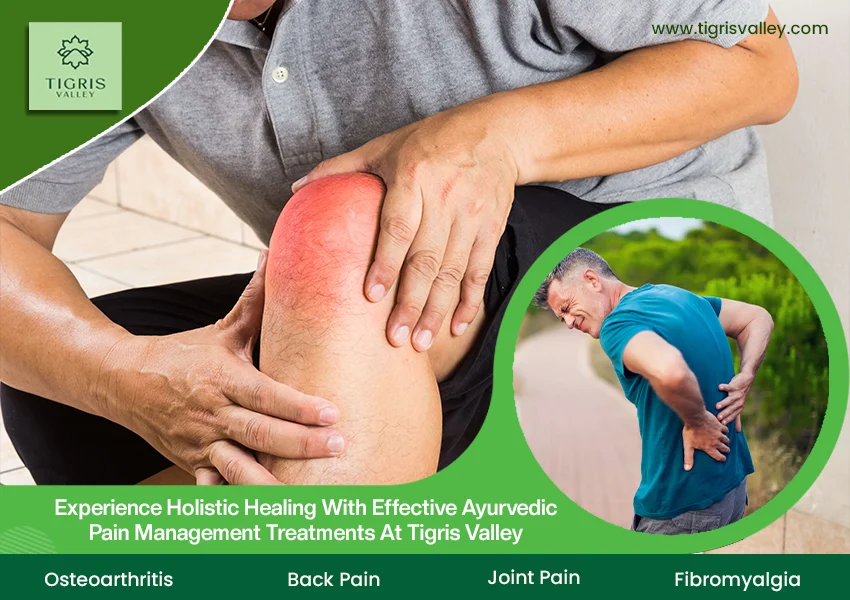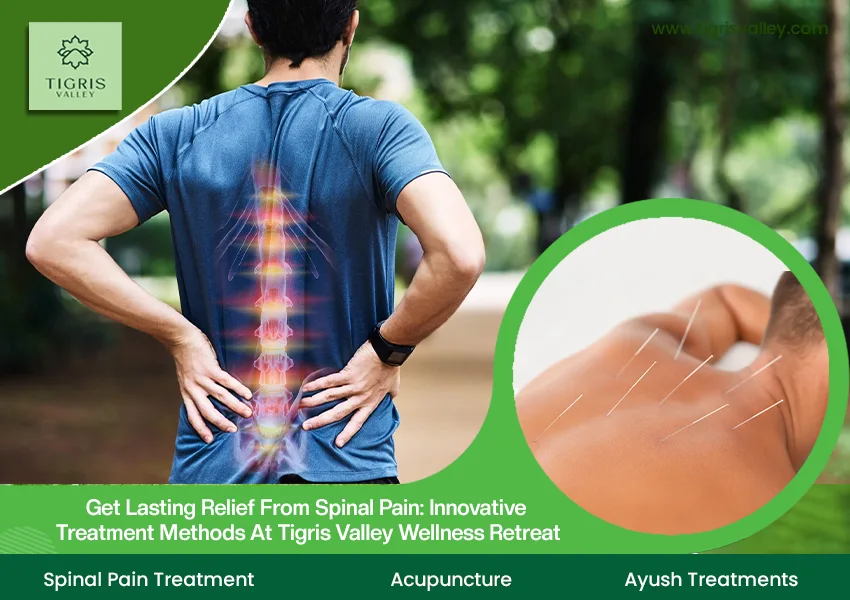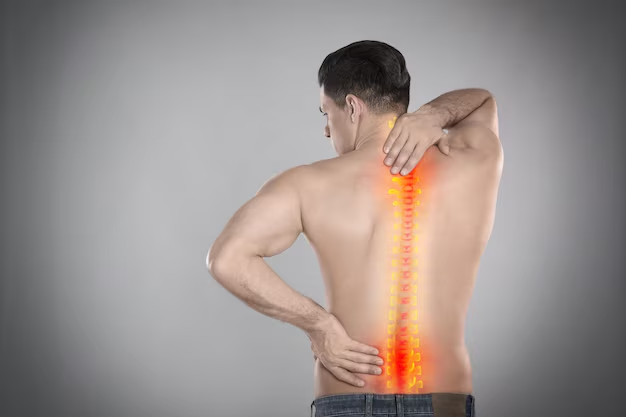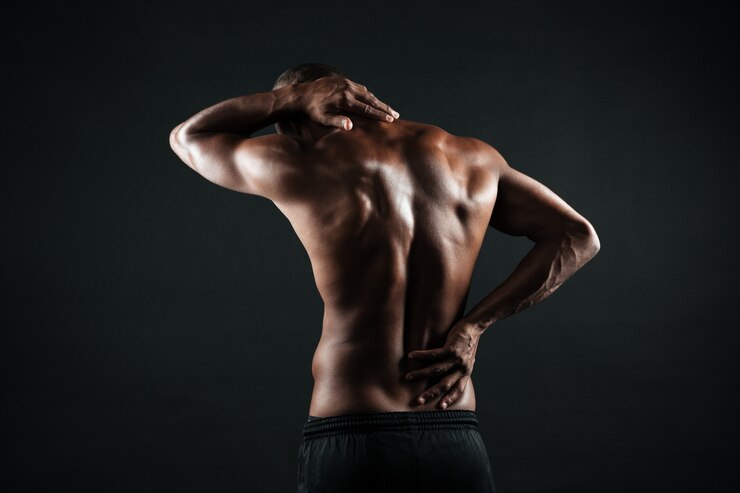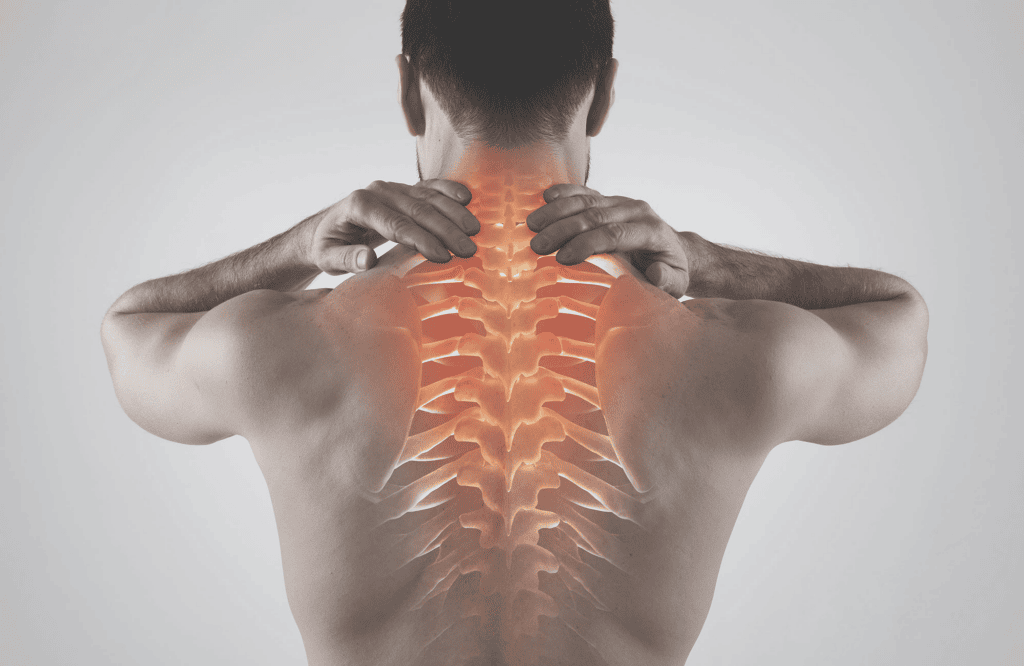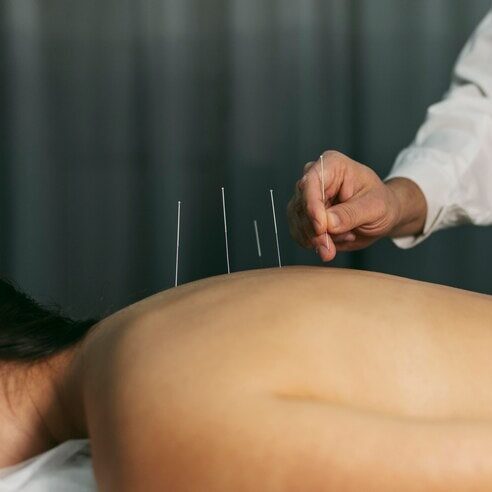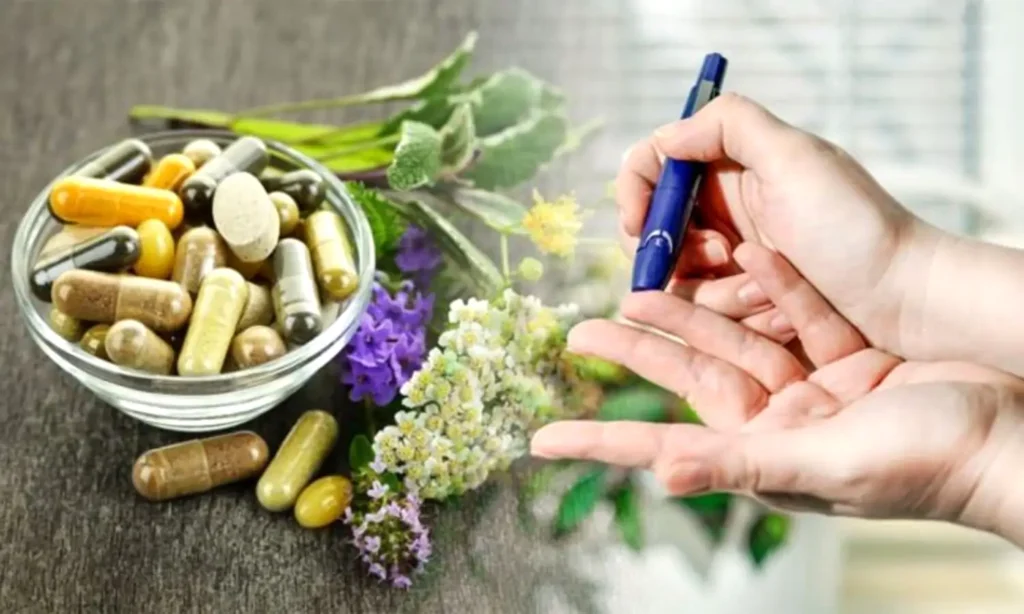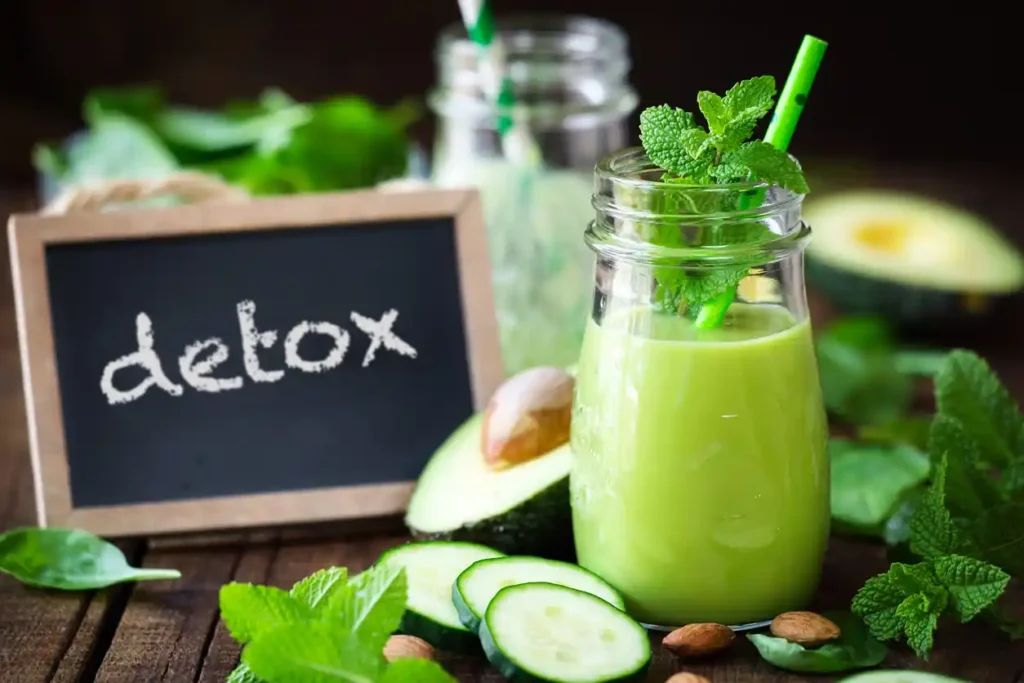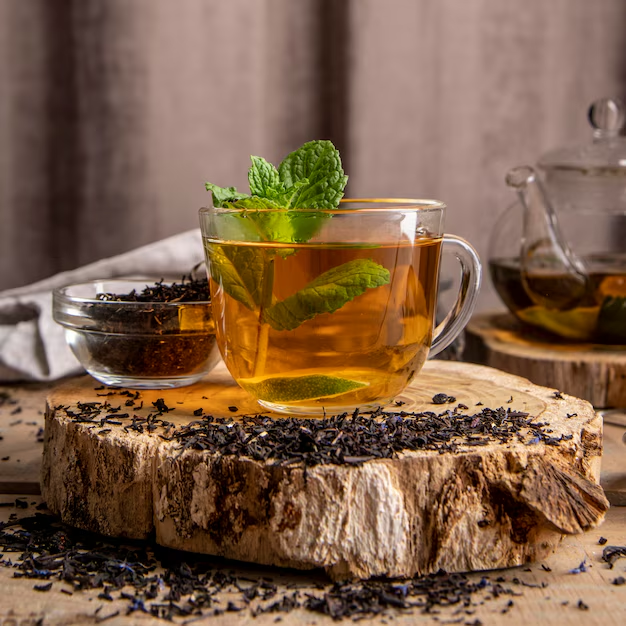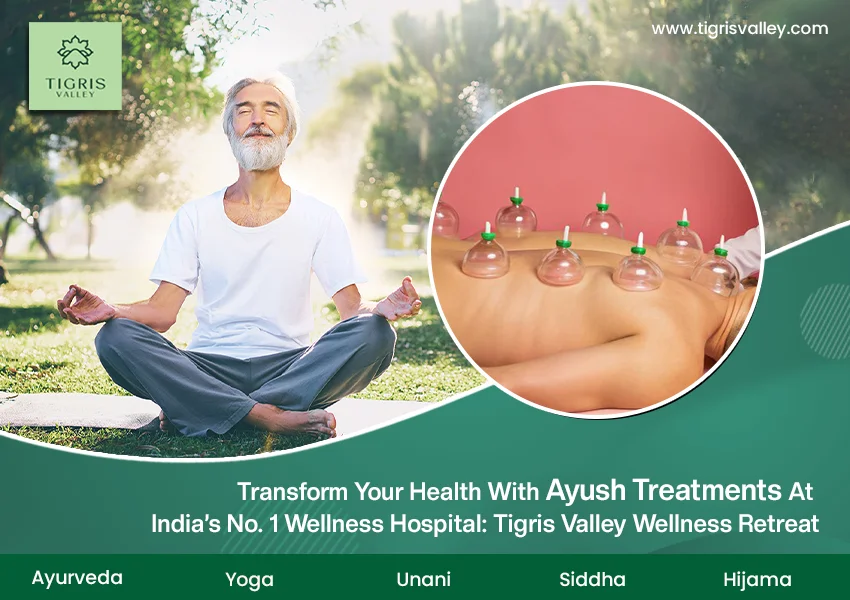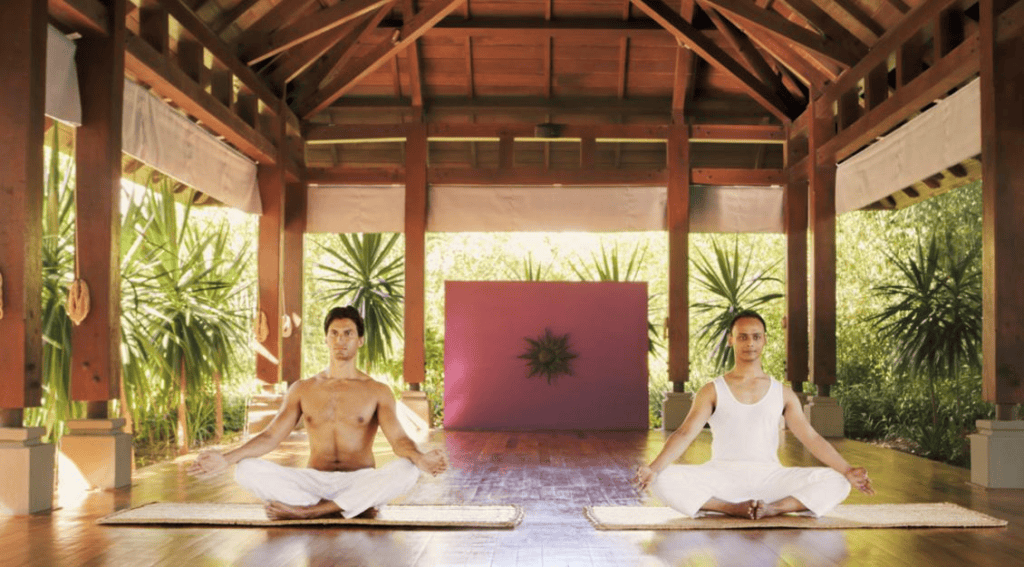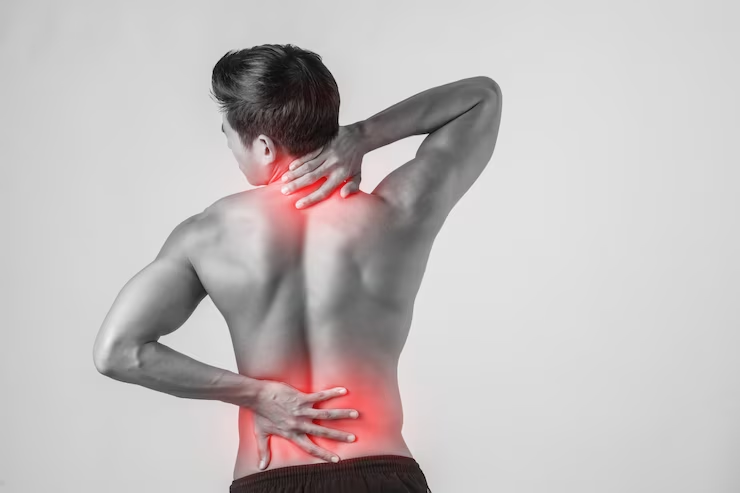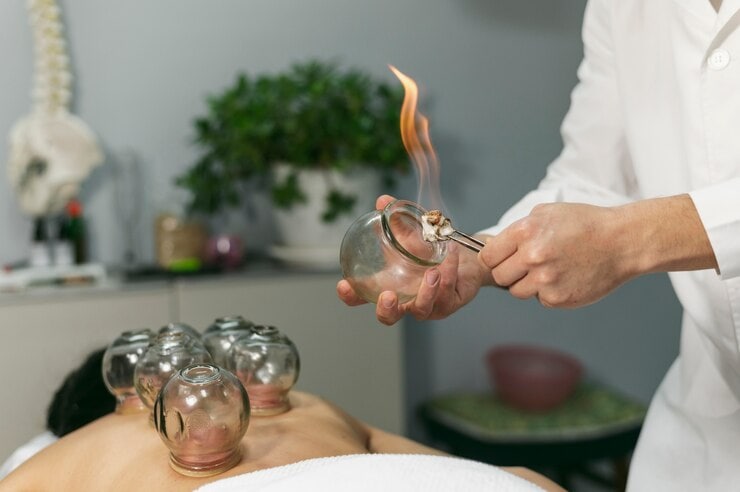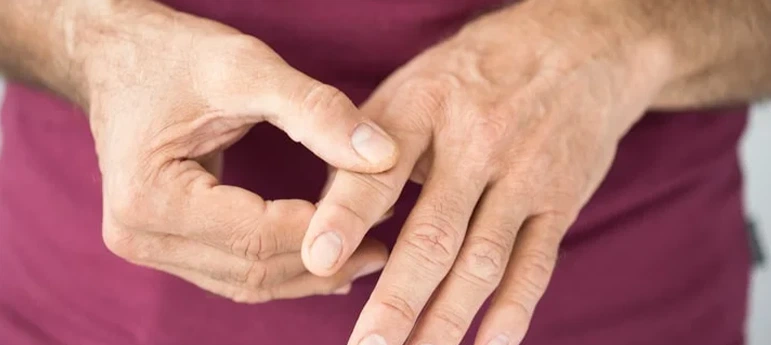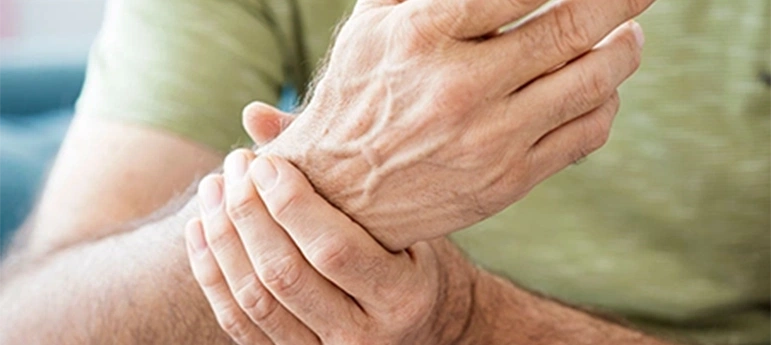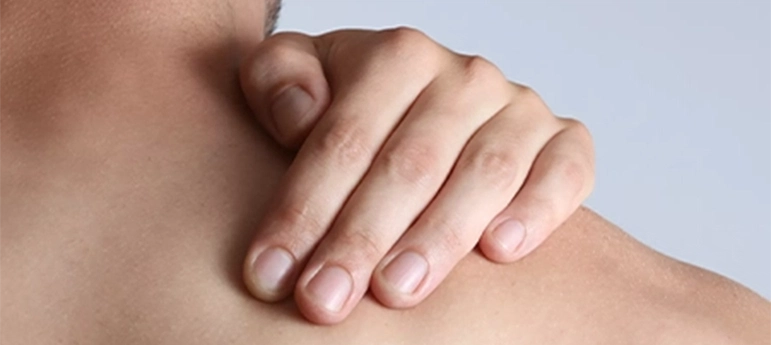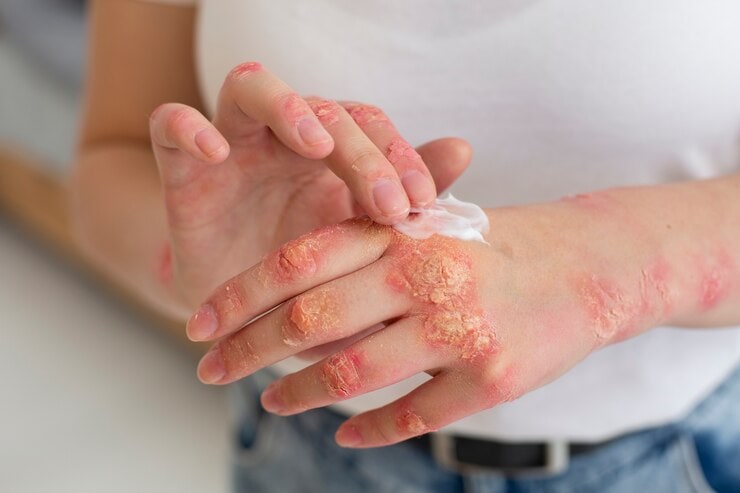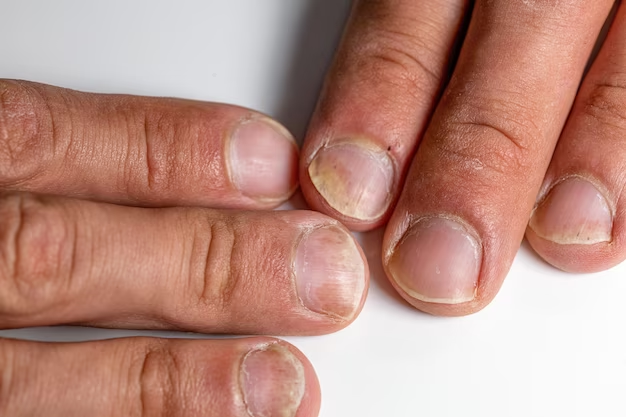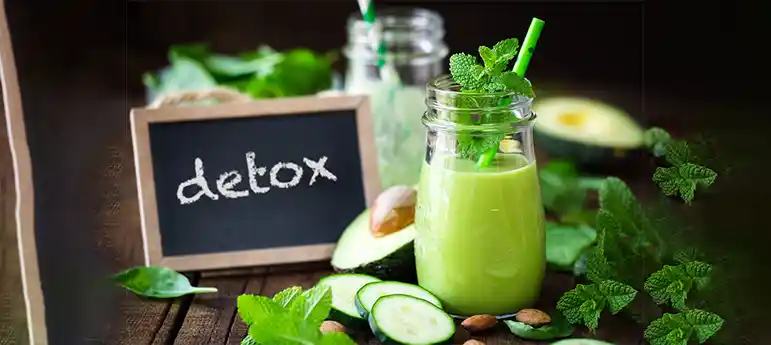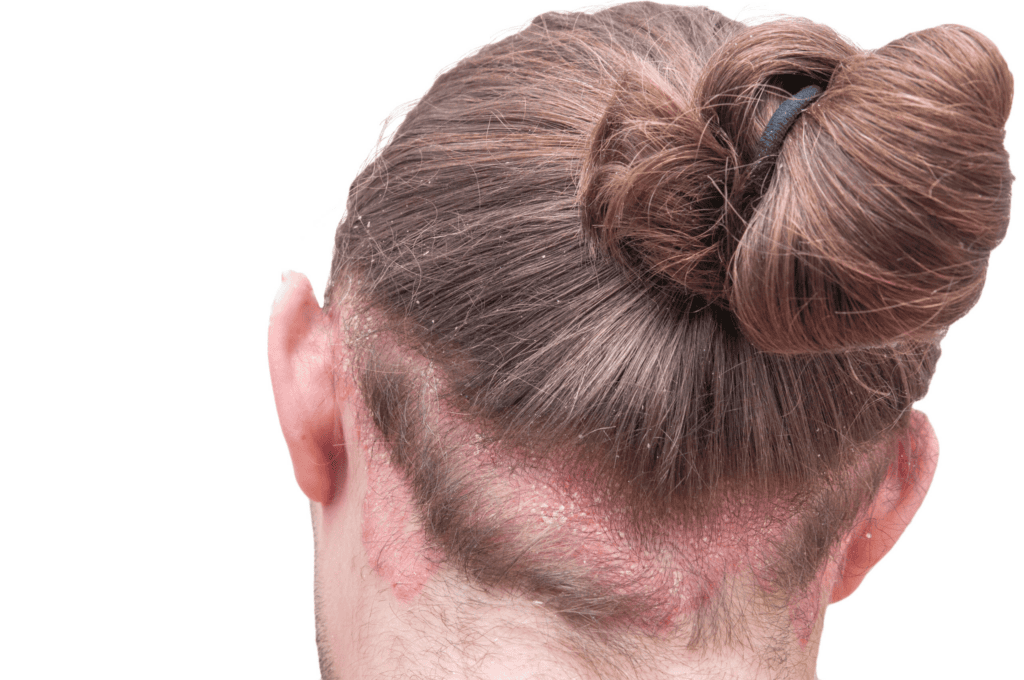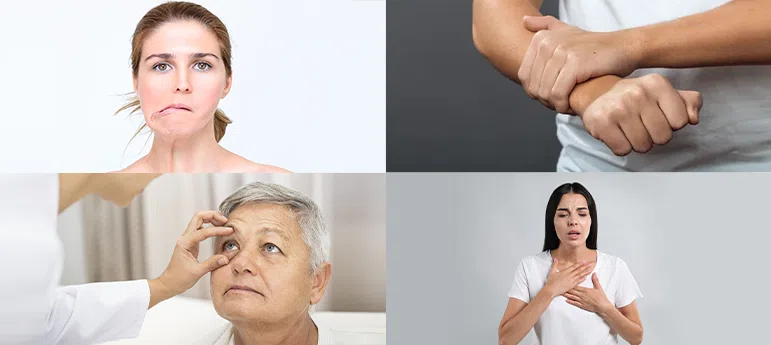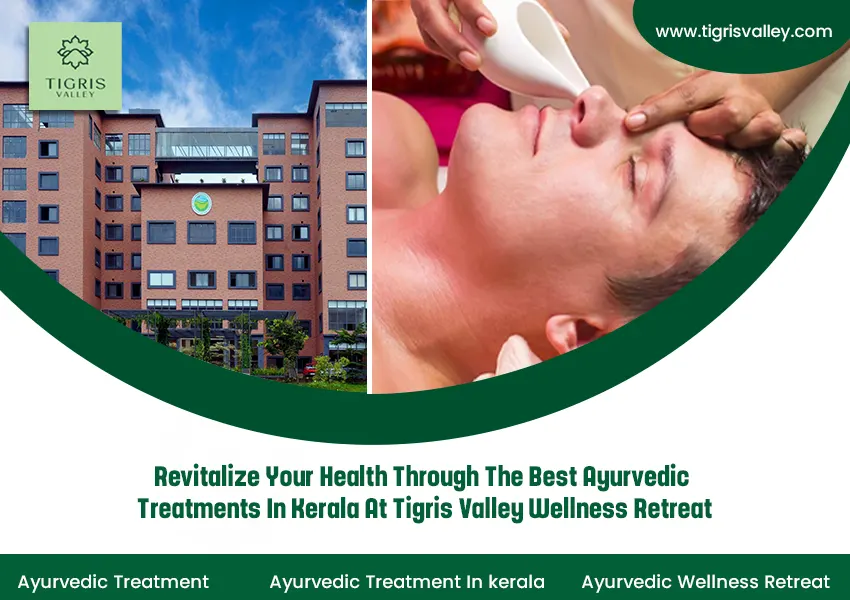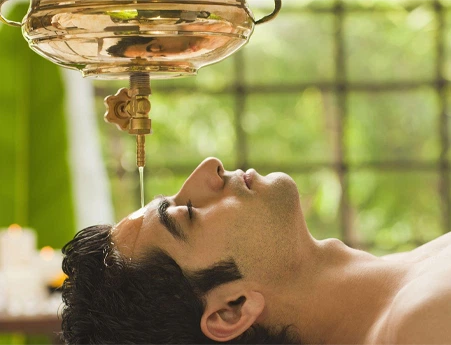Experience Holistic Healing with Effective Ayurvedic Pain Management Treatments at Tigris Valley
Pain is a complex experience that can affect anyone, regardless of age, gender, or background. It isn’t just a physical feeling; it also includes emotional, mental, and social aspects. Pain can feel very different for each person; what one person finds severe, another might handle easily. Factors like stress, mood, and expectations can affect how we realize pain, making it a very personal experience. Pain is primarily categorized into two types: acute and chronic. Acute pain is short-term, often occurring suddenly due to injuries, surgery, or illness, and usually subsides as the underlying cause heals. Alternatively, chronic pain lasts for more than three months and may arise from conditions such as arthritis, fibromyalgia, back pain, joint pain, or previous injuries. Additionally, neuropathic pain results from nerve damage, feeling sharp or burning, while physical pain arises from tissue damage or swelling, often described as aching. The impact of pain varies by age; children usually face acute pain from injuries or infections, while young adults may experience acute pain from sports injuries and chronic issues like fibromyalgia. Middle-aged adults often deal with chronic pain related to osteoarthritis and lifestyle factors, whereas older adults commonly suffer from age-related conditions like arthritis, leading to a higher prevalence of chronic pain. Understanding these differences is important for finding the right treatments and enhancing the quality of life for everyone, regardless of age.
Tigris Valley, a premium ayurvedic wellness hospital provides the best pain management treatment that focuses on holistic healing from various types of pain, including joint and back pain. The treatment combines herbal medicine, physical therapies like massage and acupuncture, and mind-body techniques such as yoga and meditation to address both physical and emotional aspects of pain. Our team of experienced physicians, physical therapists, psychologists, and complementary medicine practitioners collaborate to create personalized treatment plans. We offer a range of services designed to effectively manage chronic pain conditions. Personalized dietary guidance focuses on anti-inflammatory foods, while lifestyle modifications help individuals maintain long-term wellness. This integrated approach aims to provide effective relief and enhance the overall quality of life.
Here, we look at treatments for osteoarthritis, back pain, knee pain, joint pain, and Fibromyalgia covering both traditional and new methods to help you find effective solutions.
Why is Ayurveda an Effective Treatment for Osteoarthritis?
Osteoarthritis is a degenerative joint disease characterized by the destruction of cartilage, the protective tissue that cushions the ends of bones in a joint. As the cartilage wears away, bones may begin to rub against each other, leading to pain, stiffness, swelling, and decreased mobility. Osteoarthritis commonly affects weight-bearing joints, such as the knees, hips, and spine, but it can also impact the hands and other joints. The condition often develops gradually and is more prevalent in older adults, though it can occur in younger individuals, particularly those with previous joint injuries or genetic predispositions. Risk factors include age, obesity, joint overuse, and family history. Symptoms can vary in intensity and may worsen with activity and improve with rest. While there is no cure for osteoarthritis, various treatments, including lifestyle modifications, physical therapy, medications, and in some cases, surgery, can help manage symptoms and improve quality of life. Our effective osteoarthritis treatment focuses on relieving pain and enhancing mobility.
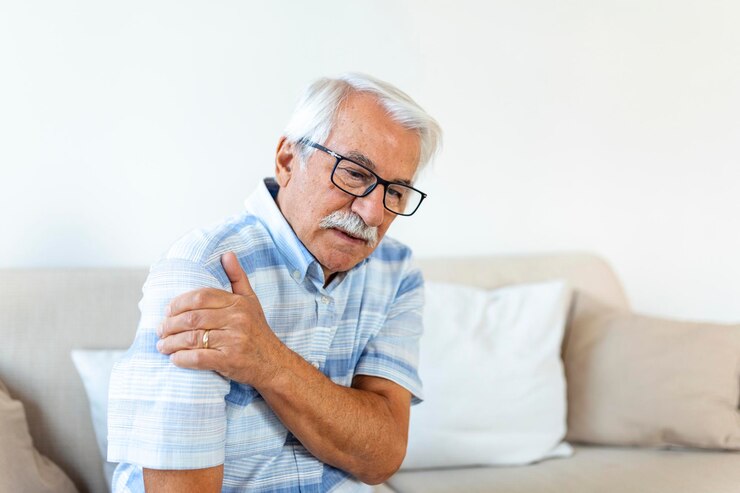
Ayurveda offers a comprehensive and holistic approach to managing osteoarthritis, making it an effective solution for this condition. Utilizing a variety of natural remedies, such as turmeric, ginger, and boswellia, Ayurveda focuses on reducing pain and inflammation. Each osteoarthritis treatment plan is personalized, as practitioners assess an individual’s unique constitution and health status to ensure the therapies address specific needs. Dietary guidance is also a key component, emphasizing an anti-inflammatory diet rich in whole foods and healthy fats to support joint health. Detoxification therapies like Panchakarma treatment aim to cleanse the body of toxins that may contribute to inflammation. Additionally, Ayurveda highlights the importance of mental and emotional well-being, incorporating practices like yoga and meditation to promote relaxation and reduce stress. Sustainable lifestyle modifications, including regular exercise and proper sleep hygiene, further enhance joint health. Together, these elements create a holistic framework that not only alleviates symptoms but also fosters long-term health and well-being in individuals with osteoarthritis.
At Tigris Valley, ayurvedic osteoarthritis treatment takes a holistic approach, combining traditional and modern therapies to relieve pain and improve joint function. The program includes personalized herbal remedies to reduce inflammation, physical therapies like massage and acupuncture to enhance mobility, and dietary guidance focusing on anti-inflammatory foods. Additionally, practices such as yoga and meditation are integrated to promote overall well-being and stress relief. This comprehensive treatment strategy aims to address both the physical symptoms and underlying causes of osteoarthritis, helping individuals achieve a better quality of life.
Ayurveda & Panchkarma Are Beneficial for Backpain?
Ayurveda and Panchakarma offer effective solutions for managing back pain through their holistic and individualized approaches. Ayurveda identifies the root causes of pain by assessing an individual’s unique constitution and imbalances, allowing for personalized treatment plans. Key herbal remedies, such as turmeric and ginger, are utilized for their anti-inflammatory properties to relieve discomfort. Ayurvedic Panchakarma treatment, a detoxification and rejuvenation therapy, plays a crucial role in removing toxins and restoring balance to the body. Techniques such as Abhyanga (therapeutic oil massage) and Kati Basti (localized treatment for the lower back) specifically target back pain, promoting relaxation and improved circulation. Additionally, Ayurvedic lifestyle recommendations, including yoga and dietary adjustments, enhance overall well-being and strengthen the musculoskeletal system. Together, these practices address both the symptoms and underlying issues, providing a comprehensive approach to relieving back pain and promoting long-term health.

Tigris Valley provides the best back pain treatment in Kerala and employs a holistic approach that integrates traditional and modern techniques to provide comprehensive relief. The back pain treatment program begins with a thorough assessment to understand the root causes of pain, allowing for personalized treatment plans. Key components include herbal remedies known for their anti-inflammatory and analgesic properties, aimed at reducing discomfort and promoting healing. Physical therapies, such as therapeutic massages and acupuncture, are incorporated to improve mobility and reduce tension in the back muscles. Panchakarma treatments, including targeted therapies like Kati Basti, focus on full-body detoxification and rejuvenation, addressing both symptoms and underlying issues. Additionally, the program emphasizes lifestyle modifications, including yoga and dietary recommendations, to enhance overall well-being and strengthen the back. This approach not only aims back pain relief but also supports long-term health and improved quality of life for individuals suffering from back pain.
How to Manage Knee Pain with Ayurveda?
Managing knee pain with Ayurveda involves a holistic approach that includes dietary modifications, herbal remedies, and lifestyle changes. Start by incorporating anti-inflammatory foods like turmeric, ginger, and garlic, along with healthy fats such as olive oil and ghee, to help lubricate the joints. Staying hydrated is essential, so drink plenty of water and herbal teas. Herbal remedies like turmeric, devil’s claw, and ashwagandha can provide additional relief. Regular low-impact exercise, such as yoga or swimming, strengthens the muscles around the knee while maintaining a healthy weight and reducing stress on the joints. Consider Panchakarma therapy, which includes oil massages and herbal treatments to detoxify the body and alleviate inflammation. Additionally, practicing meditation and breathing exercises can help manage stress, further reducing pain. Proper posture and body mechanics during activities are crucial to avoid unnecessary strain. For personalized advice, consult a qualified Ayurvedic practitioner who can customize an Ayurvedic treatment for Knee to your specific needs. By integrating these Ayurvedic principles, you can effectively manage knee pain and enhance overall joint health.
Role of Unani Medicine for Muscle and Joint Pain
Unani medicine offers a holistic approach to managing muscle and joint pain, emphasizing the balance of bodily humor and utilizing natural remedies. Herbal remedies are known for their anti-inflammatory and analgesic properties, such as ginger, and turmeric which can help to reduce pain and inflammation. Dietary recommendations play a crucial role, in promoting a balanced diet that includes anti-inflammatory foods like olive oil, fish, and nuts, while avoiding foods that can increase inflammation. Traditional Ayush treatments like Hijama, or cupping therapy, produce a vacuum on specified areas to improve circulation and promote healing. Additionally, Unani medicine incorporates various forms of massage using herbal oils to relieve stiffness and enhance blood flow. Lifestyle modifications, including regular exercise and stress management techniques, further support overall health and well-being. Through this integrated approach, Unani medicine provides effective relief for people suffering from muscle and joint pain, improving their quality of life.
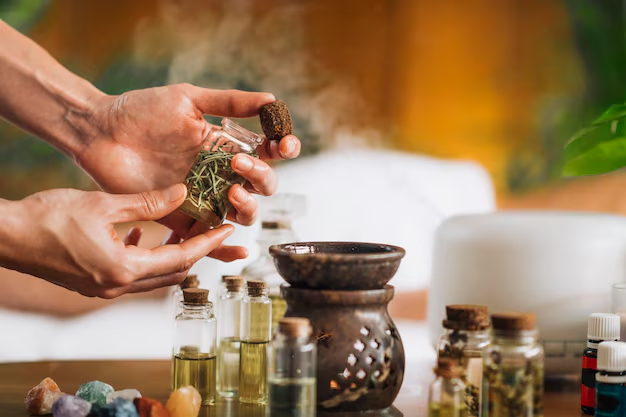
At Tigris Valley, our Unani treatment approach focuses on natural healing and emphasizes the balance of the body, mind, and spirit. Unani medicine utilizes natural remedies to address various health conditions. Our experienced practitioners conduct thorough assessments to identify individual imbalances and tailor treatment plans accordingly. We offer a range of therapies, including herbal medications, dietary recommendations, and lifestyle modifications, to promote overall wellness. Specific treatments may involve cupping therapy, massages, and other traditional techniques aimed at enhancing circulation and alleviating pain. Tigris Valley provides a unique setting for Unani treatment in Kerala, allowing patients to relax and rejuvenate. Our goal is to deliver effective Unani therapies that support healing, boost the immune system, and improve the quality of life for our patients.
How to Recognize Fibromyalgia? Signs and Symptoms
Fibromyalgia is a chronic condition characterized by widespread pain, fatigue, and various other symptoms that can significantly impact daily life. One of the primary signs is persistent, dull pain felt throughout the body, often affecting both sides and all areas. This Fibromyalgia pain is accompanied by severe tiredness that doesn’t improve with rest, alongside sleep disturbances such as difficulty falling or staying asleep, leading to unrefreshing sleep. Many individuals also experience cognitive issues, commonly referred to as “fibro fog,” which can manifest as trouble concentrating, forgetfulness, and confusion. Additionally, people with fibromyalgia often have tender points on specific areas of the body that are sensitive to pressure, such as the neck, shoulders, and hips. Mood disorders like anxiety and depression frequently accompany the condition, exacerbating the perception of pain and fatigue. Other symptoms may include increased sensitivity to touch, frequent headaches, digestive issues like irritable bowel syndrome, and sensations of numbness or tingling in the extremities. If you recognize several of these signs, it’s essential to consult our healthcare professional for a thorough evaluation, as early diagnosis and a customized treatment plan can greatly improve your quality of life.

Tigris Valley offers a holistic approach to managing fibromyalgia through Ayurvedic treatment for fibromyalgia, blending traditional remedies with modern therapies. Key treatments include herbal remedies like turmeric and ginger for inflammation, physical therapies such as massage and acupuncture, and mind-body practices like yoga and meditation to reduce stress and improve flexibility. An anti-inflammatory diet and lifestyle modifications, including better sleep hygiene, are also emphasized. Additionally, counseling groups provide emotional and practical assistance, creating a treatment plan that addresses the different aspects of fibromyalgia.
Ayush Treatments For Fibromyalgia
AYUSH treatments, which encompass Ayurveda, Yoga, Unani, Siddha, and Homeopathy, provide a holistic approach to managing fibromyalgia. Ayurvedic treatments in Kerala focus on balancing the body’s doshas (Vata, Pitta, Kapha) through personalized herbal remedies, dietary changes, and detoxification therapies like Panchakarma, helping to reduce inflammation and alleviate pain. Yoga promotes flexibility, strength, and relaxation, which can be beneficial in managing symptoms by reducing stress and improving overall well-being. Unani medicine utilizes natural remedies and therapies to enhance the body’s healing processes, incorporating herbal medicines and lifestyle changes to support pain management and boost energy levels. Siddha medicine emphasizes herbal treatments and holistic practices to restore balance in the body, potentially relieving symptoms through detoxification and rejuvenation. Homeopathy offers tailored remedies based on individual symptoms, addressing pain and fatigue associated with fibromyalgia. Overall, Our AYUSH treatment hospital aims to manage the root causes of fibromyalgia and enhance the quality of life through a combination of natural therapies, lifestyle adjustments, and supportive practices.
Ayurveda in Ayush Treatment offers a holistic approach to managing fibromyalgia by addressing its root causes and promoting balance in the body and mind. Personalized herbal remedies, such as turmeric, ashwagandha, and ginger, are commonly recommended for their anti-inflammatory and analgesic properties, helping to alleviate pain and reduce inflammation. An Ayurvedic diet emphasizes whole foods and seasonal fruits while avoiding processed items, supporting overall health. Complete Body Detoxification treatments like Panchakarma cleanse the body of toxins, improving energy levels. Additionally, mind-body practices such as yoga, meditation, and pranayama promote relaxation and stress reduction, essential for managing chronic pain. Ayurvedic massages with warm herbal oils relieve muscle tension and enhance circulation.
Overall, by focusing on individualized care and natural treatments, Ayurveda provides a comprehensive framework for managing fibromyalgia, helping individuals find relief from symptoms and improve their quality of life. At Tigris Valley Wellness Retreat in India, we offer specialized AYUSH-based pain management treatments for fibromyalgia, focusing on natural healing and long-term relief. AYUSH (Ayurveda, Yoga & Naturopathy, Unani, Siddha, and Homeopathy) emphasizes balancing the body, mind, and spirit to reduce pain and promote well-being.

Tigris Valley Wellness Resort offers an integrated ayurvedic pain management treatment in Kerala that addresses various pain conditions. Our dedicated expert team of experienced practitioners focuses on personalized care, utilizing therapies rooted in Ayurvedic and holistic principles. By assessing each individual’s unique needs, we create customized treatment plans that promote healing, reduce pain, and enhance overall wellness. With a focus on natural remedies, lifestyle adjustments, and supportive therapies, Tigris Valley is committed to helping patients achieve a better quality of life and find effective relief from their pain.

